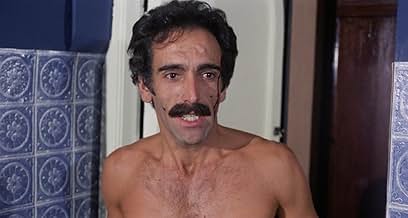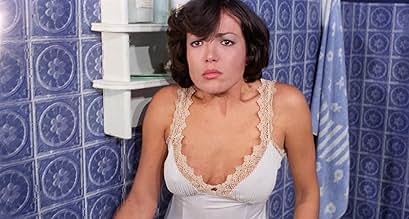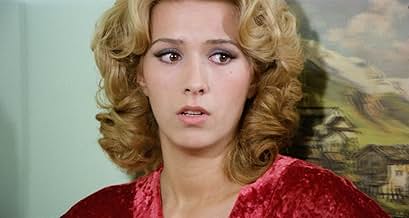Füge eine Handlung in deiner Sprache hinzuA writer arrives to an isolated boardinghouse run by a beautiful but strange woman. Shortly after his arrival, guests start to get violently killed.A writer arrives to an isolated boardinghouse run by a beautiful but strange woman. Shortly after his arrival, guests start to get violently killed.A writer arrives to an isolated boardinghouse run by a beautiful but strange woman. Shortly after his arrival, guests start to get violently killed.
Heinrich Starhemberg
- Daniel
- (as Henry Gregor)
Tony García Jr.
- Young Boy
- (as Tony Garcia Pablo)
León Klimovsky
- Paisano
- (Nicht genannt)
Empfohlene Bewertungen
A writer stops off at a secluded bed and breakfast run by the battered wife of a mysterious man who spends all his time upstairs in his room. That is except when he's killing off the lodgers downstairs.
If you've seen more than 3 horror movies in your lifetime, the big twists in Trauma won't come as any big surprise, but it's not the worst film of its type and it keeps things entertaining. It features a lot more sexuality than expected with just about everyone in the film getting naked and having sex at some point. The gore effects are of the cheap variety with some razor slashes that don't completely convince.
If you've seen more than 3 horror movies in your lifetime, the big twists in Trauma won't come as any big surprise, but it's not the worst film of its type and it keeps things entertaining. It features a lot more sexuality than expected with just about everyone in the film getting naked and having sex at some point. The gore effects are of the cheap variety with some razor slashes that don't completely convince.
This Spanish thriller from 1977 tells the story of a writer, who takes some days off to write his new novel. He's coming to a guesthouse at a lake in the midst of Spain's countryside. The owner of the guesthouse is an attractive woman with a problem: her sick husband that nobody is allowed to see except for her. Truth is that the husband doesn't exist (anymore), but she's schizophrenic. And while the author is spared, other guests fall victim to a gloved killer with a razor. Is it the schizophrenic owner or someone else?
Director Leon Klimovsky is best known for his low-budgeted straight horror films, so this solid thriller is quite an unusual work in his oeuvre, and also one of his less known efforts. Even though it's not very original and borrows heavily from films like Hitchcock's "Psycho" or even the cool Spanish horror thriller "Una Vela Para el Diablo" (1973), it's still quite thrilling and boosts some scary moments. The murder scenes are done in Italian Giallo-style and, even though simply done, quite gory. The unknown cast is not first rate, but also give solid performances. The end of the film is a bit irritating and a lowdown in a way. All in all, "Violación Fatal" is an interesting little thriller for aficionados of European horror and thriller films. Rating: 6 out of 10.
Director Leon Klimovsky is best known for his low-budgeted straight horror films, so this solid thriller is quite an unusual work in his oeuvre, and also one of his less known efforts. Even though it's not very original and borrows heavily from films like Hitchcock's "Psycho" or even the cool Spanish horror thriller "Una Vela Para el Diablo" (1973), it's still quite thrilling and boosts some scary moments. The murder scenes are done in Italian Giallo-style and, even though simply done, quite gory. The unknown cast is not first rate, but also give solid performances. The end of the film is a bit irritating and a lowdown in a way. All in all, "Violación Fatal" is an interesting little thriller for aficionados of European horror and thriller films. Rating: 6 out of 10.
Trauma is very similar to Alfred Hitchcock's Psycho in that we're given an outsider who shows up to a strange secluded hotel where the owner has a big secret and people are getting murdered. For a European horror film, it's low on style and gore and feels more like a cheapo exploitation film from the U. S. around that time. There's not enough insanity to make it a worthwhile watch except for completeists.
TRAUMA is a late entry in the career of Spanish horror director Leon Klimovsky. Like A DRAGONFLY FOR EACH CORPSE and BLUE EYES OF THE BROKEN DOLL, it's a Spanish-themed giallo, although the actual inspiration is much more obvious: like SISTERS before it, this is a film which owes its existence to Hitchcock's PSYCHO.
The setting is rural Spain and a slightly run-down boarding house occupied by the usual oddballs including a writer and a couple of sexed-up couples (well, it was the 1970s). Before long a series of brutal razor slayings are taking place, and the viewer is left wondering who's responsible. Well, not really; the identity of the killer is blindingly obvious from the outset, but this doesn't detract from the film's entertainment value. Brutal murders, violent flashbacks, and a sedate pace follow.
The huge bonus here is Klimovsky's exemplary direction; this is a guy who could take a low budget and always make his film look fantastic. A succession of effective establishing shots and an emphatic, low key score combine to give the whole film a sinister atmosphere. The photography is good enough to keep things interesting despite the slow pace and lack of action. The gore is a bit shoddy, but the film feels very brutal nonetheless, and the climax is worth waiting for.
The setting is rural Spain and a slightly run-down boarding house occupied by the usual oddballs including a writer and a couple of sexed-up couples (well, it was the 1970s). Before long a series of brutal razor slayings are taking place, and the viewer is left wondering who's responsible. Well, not really; the identity of the killer is blindingly obvious from the outset, but this doesn't detract from the film's entertainment value. Brutal murders, violent flashbacks, and a sedate pace follow.
The huge bonus here is Klimovsky's exemplary direction; this is a guy who could take a low budget and always make his film look fantastic. A succession of effective establishing shots and an emphatic, low key score combine to give the whole film a sinister atmosphere. The photography is good enough to keep things interesting despite the slow pace and lack of action. The gore is a bit shoddy, but the film feels very brutal nonetheless, and the climax is worth waiting for.
Iolación fatal is a grim, unsettling entry in the late-70s wave of Spanish exploitation cinema, wrapped in the aesthetics of a psychological thriller but weighed down by uneven execution. While the film touches on disturbing themes and presents a few stylistic flourishes, it struggles to rise above the genre's more gratuitous tendencies.
Atmospherically, the film succeeds in creating a sense of dread. The lighting is often stark and moody, particularly in interior scenes where shadows feel like silent observers. Cinematographer Francisco Sánchez captures a creeping tension in narrow hallways and dimly lit bedrooms, often allowing the frame to linger just long enough to unsettle. Yet, this stylistic care doesn't always carry through. Some scenes fall flat visually, with pedestrian compositions or abrupt edits that undercut their emotional weight. There's a disconnect between the visual intent and the rhythm of the narrative, which makes the film feel choppy at times.
Performance-wise, the cast handles the material with varying degrees of conviction. Ágata Lys delivers a haunting and layered performance, striking a delicate balance between vulnerability and restrained strength. Her presence anchors the film, elevating scenes that might have otherwise veered into exploitation without nuance. In contrast, some supporting actors fall into melodrama, lacking the subtlety the script seems to call for. Still, even with these inconsistencies, there's a raw sincerity in several exchanges that makes the human drama feel real, if not always well-paced.
The film's major flaw lies in its tendency toward sensationalism. At points, it leans heavily on nudity and lurid scenarios to provoke rather than explore. This often blunts the psychological depth the film flirts with, leaving some scenes feeling gratuitous instead of essential. There's an undercurrent of commentary about trauma and guilt, but it never fully matures into something cohesive. Instead, the movie circles its themes, hesitant to confront them head-on.
In the end, Violación fatal is a mixed bag. It has moments of genuine tension and some striking visual choices, but it lacks the narrative focus and restraint to elevate its subject matter. Ágata Lys's performance remains the most memorable element, a compelling center in a film that too often drifts toward exploitation without clear purpose.
Atmospherically, the film succeeds in creating a sense of dread. The lighting is often stark and moody, particularly in interior scenes where shadows feel like silent observers. Cinematographer Francisco Sánchez captures a creeping tension in narrow hallways and dimly lit bedrooms, often allowing the frame to linger just long enough to unsettle. Yet, this stylistic care doesn't always carry through. Some scenes fall flat visually, with pedestrian compositions or abrupt edits that undercut their emotional weight. There's a disconnect between the visual intent and the rhythm of the narrative, which makes the film feel choppy at times.
Performance-wise, the cast handles the material with varying degrees of conviction. Ágata Lys delivers a haunting and layered performance, striking a delicate balance between vulnerability and restrained strength. Her presence anchors the film, elevating scenes that might have otherwise veered into exploitation without nuance. In contrast, some supporting actors fall into melodrama, lacking the subtlety the script seems to call for. Still, even with these inconsistencies, there's a raw sincerity in several exchanges that makes the human drama feel real, if not always well-paced.
The film's major flaw lies in its tendency toward sensationalism. At points, it leans heavily on nudity and lurid scenarios to provoke rather than explore. This often blunts the psychological depth the film flirts with, leaving some scenes feeling gratuitous instead of essential. There's an undercurrent of commentary about trauma and guilt, but it never fully matures into something cohesive. Instead, the movie circles its themes, hesitant to confront them head-on.
In the end, Violación fatal is a mixed bag. It has moments of genuine tension and some striking visual choices, but it lacks the narrative focus and restraint to elevate its subject matter. Ágata Lys's performance remains the most memorable element, a compelling center in a film that too often drifts toward exploitation without clear purpose.
Wusstest du schon
- WissenswertesHeinrich Starhemberg (aka Henry Gregor), as Daniel, is also the movie's executive producer.
- PatzerWhen Daniel Meets Veronica for the first time, she accidentally drops a wine bottle on the floor smashing it. in the next shot the broken bottle and the spilled wine are not seen.
- Crazy CreditsThe closing credits appear on a still photography of one of the characters.
- VerbindungenReferences Der Wolfsmensch (1941)
Top-Auswahl
Melde dich zum Bewerten an und greife auf die Watchlist für personalisierte Empfehlungen zu.
- How long is Trauma?Powered by Alexa
Details
- Laufzeit1 Stunde 27 Minuten
- Sound-Mix
- Seitenverhältnis
- 1.85 : 1
Zu dieser Seite beitragen
Bearbeitung vorschlagen oder fehlenden Inhalt hinzufügen

Oberste Lücke
By what name was Violación fatal (1978) officially released in India in English?
Antwort

























